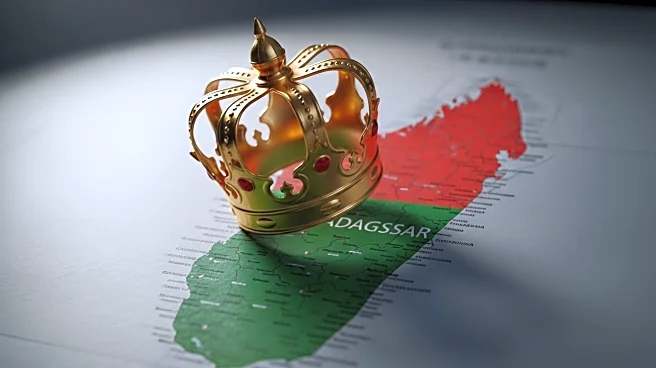What is the story about?
What's Happening?
Madagascar's President Andry Rajoelina announced that an attempted coup is underway following the involvement of an elite army unit in anti-government protests. The protests, led by a group called 'Gen Z Madagascar,' have been ongoing for three weeks, sparked by dissatisfaction with government policies and leadership. The elite CAPSAT unit, which played a role in a previous coup in 2009, has reportedly exchanged fire with security forces, resulting in the death of one soldier. The protests have resulted in at least 22 deaths, according to the United Nations, although the government disputes these figures. The unrest began over issues such as electricity and water outages but has expanded to include broader grievances like poverty, corruption, and the cost of living.
Why It's Important?
The situation in Madagascar is significant as it highlights ongoing political instability in the region, which could have implications for international relations and economic conditions. The involvement of military forces in protests against the government raises concerns about the potential for further violence and disruption. The U.S. Embassy has advised American citizens to shelter in place due to the volatile situation, indicating potential risks for foreign nationals and international interests. The African Union has called for calm and restraint, emphasizing the need for peaceful resolution. The protests reflect widespread dissatisfaction with the current administration, which could lead to changes in leadership or policy if the situation escalates.
What's Next?
The future of Madagascar's political landscape remains uncertain as the government faces pressure from both domestic and international entities. President Rajoelina's administration may need to address the protesters' demands to prevent further escalation. The international community, including organizations like the United Nations and the African Union, may increase diplomatic efforts to mediate the situation. The potential for a change in leadership or government policy could impact Madagascar's relations with other countries and its economic stability. Continued unrest may lead to further intervention by military forces, which could alter the balance of power within the country.
Beyond the Headlines
The attempted coup in Madagascar underscores the challenges faced by nations with histories of political instability and military involvement in governance. The protests, driven by youth movements and civic groups, highlight the growing influence of social media and digital platforms in mobilizing public dissent. The situation raises ethical questions about the role of military forces in civilian governance and the protection of democratic processes. Long-term implications may include shifts in political alliances and changes in governance structures, as well as potential impacts on regional stability in the Indian Ocean area.

















